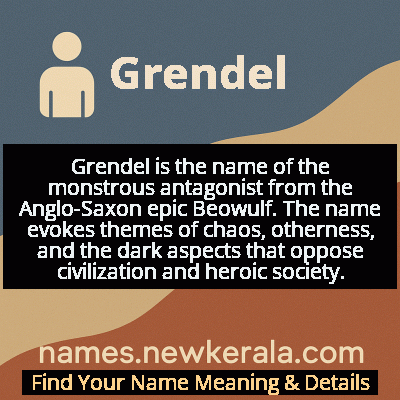Grendel Name Meaning & Details
Origin, Popularity, Numerology Analysis & Name Meaning of Grendel
Discover the origin, meaning, and cultural significance of the name GRENDEL. Delve into its historical roots and explore the lasting impact it has had on communities and traditions.
Name
Grendel
Gender
Male
Origin
Anglo
Lucky Number
2
Meaning of the Name - Grendel
Grendel is the name of the monstrous antagonist from the Anglo-Saxon epic Beowulf. The name evokes themes of chaos, otherness, and the dark aspects that oppose civilization and heroic society.
Grendel - Complete Numerology Analysis
Your Numerology Number
Based on Pythagorean Numerology System
Ruling Planet
Moon
Positive Nature
Diplomatic, friendly, artistic, empathetic.
Negative Traits
Over-sensitive, moody, indecisive, prone to self-pity.
Lucky Colours
Green, cream, white.
Lucky Days
Monday.
Lucky Stones
Pearl, moonstone.
Harmony Numbers
1, 3, 4.
Best Suited Professions
Diplomats, mediators, caregivers, artists.
What People Like About You
Cooperative spirit, friendliness, artistic talent.
Famous People Named Grendel
Grendel (Legendary)
Mythological Creature
Primary antagonist in Beowulf who terrorized Heorot hall for twelve years
John Gardner's Grendel
Literary Character
Protagonist of novel offering the monster's perspective on Beowulf's story
Grendel in Film Adaptations
Cinematic Character
Featured in multiple film versions of Beowulf, most notably 2007 animated film
Name Variations & International Equivalents
Click on blue names to explore their detailed meanings. Gray names with will be available soon.
Cultural & Historical Significance
The character has evolved beyond his original literary context to become an archetype of the misunderstood monster, particularly through John Gardner's 1971 novel 'Grendel,' which retells the epic from the monster's perspective, exploring themes of existentialism, loneliness, and the nature of good and evil. This transformation from pure villain to complex anti-hero reflects changing cultural attitudes toward otherness and the monstrous, making Grendel a continually relevant figure in discussions about morality, society, and the human condition.
Extended Personality Analysis
In traditional interpretation, Grendel embodies destructive, chaotic traits - he is portrayed as envious, violent, and driven by primal hatred toward human joy and community. The original Beowulf depicts him as a creature of pure malice who cannot bear the sounds of celebration and fellowship in Heorot hall, leading him to slaughter warriors night after night. His personality reflects raw, untamed nature opposing human civilization, acting on instinctual rage rather than calculated evil.
However, modern reinterpretations, particularly through Gardner's novel, have added layers of complexity to his personality. These contemporary readings suggest intelligence, loneliness, and philosophical depth - a being trapped between worlds, capable of observing human society but forever excluded from it. This duality creates a personality profile that combines raw, destructive power with profound isolation and existential questioning, making Grendel a figure of both terror and tragic sympathy. His character now represents the pain of otherness and the destructive consequences of rejection and misunderstanding.
Modern Usage & Popularity
As a given name, Grendel remains extremely rare and unconventional in modern times, primarily used by parents seeking distinctive, literary, or darkly romantic names. The name carries strong associations with its monstrous origins, making it a bold choice that often signals appreciation for Anglo-Saxon literature or a desire to subvert traditional naming conventions. While not appearing on official baby name popularity charts, Grendel has found niche usage in gothic subcultures, among literature enthusiasts, and occasionally as a middle name for those wanting to honor the character's complex modern reinterpretation as a tragic, misunderstood figure rather than purely a monster. Its usage reflects a growing trend toward embracing dark or historically significant names from mythology and literature.
Symbolic & Spiritual Meanings
Grendel symbolizes the eternal struggle between order and chaos, civilization and wilderness, community and isolation. He represents the 'shadow self' of society - the repressed darkness that threatens to overwhelm human institutions and relationships. Metaphorically, Grendel embodies existential alienation, the pain of being an outsider, and the destructive potential of envy and resentment. In modern interpretations, he has become a symbol of misunderstood otherness, questioning who truly defines what is monstrous. The character also represents nature's retaliation against human arrogance and the inevitable return of repressed elements, making him a complex symbol of both terror and tragic victimhood in different contexts, reflecting humanity's ongoing negotiation with its own darkness and the boundaries of community.

